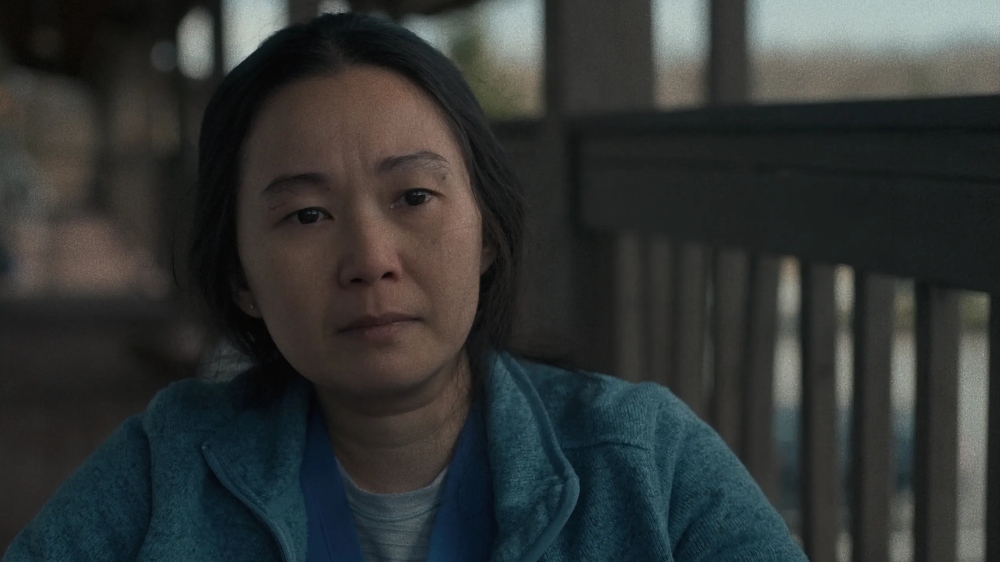Two hours of contrived miserablism posturing as an exercise in radical empathy, Darren Aronofsky’s The Whale is at least honest — rather, callously didactic — about the disgust it feels for Charlie, the 600-pound man played by Brendan Fraser at its center. The A24 film even goes so far as to open on Charlie masturbating, these furious exertions triggering a heart attack right before an evangelical missionary (Ty Simpkins) arrives to discover him gasping and incapacitated, gay porn still streaming on his laptop. Charlie is subject to many such humiliations throughout The Whale, which charts the last five days ahead of what exasperated caregiver Liz (Hong Chau) assures him will be his death from congestive heart failure.
A middle-aged English composition teacher shut inside his small Idaho apartment, outside of which it rains and rains and rains, Charlie has grown morbidly obese since his partner took his own life. Now requiring the use of a walker to move around, as well as grabber sticks to assist with picking up smaller items that have fallen out of arm’s reach, he’s largely couchbound, wheezing and choking his way through this final stretch of physical decline. Cheerfully lecturing students over Zoom about the importance of being honest in their writing even as he keeps his camera off to hide his appearance, Charlie otherwise spends his days eating. Whether Charlie is chowing down on meatball subs and buckets of fried chicken provided by Liz, devouring pizzas he orders to his front door, or guzzling plastic Diet Coke bottles kept by his bedside, Aronofsky choreographs the emotions we’re to feel toward this binge-eating — revulsion, horror, morbid curiosity — by cranking up the foley audio to emphasize its wet, squelching sounds and slathering on Rob Simonsen’s lugubrious orchestral score.

The camerawork, courtesy of Aronofsky’s longtime DP Matthew Libatique, moves around Charlie with an ease and fluidity that further scorns the character’s immobility, either coming close enough to catch the crumbs tumbling from his lips or retreating to leer at his lumbering, sweat-drenched frame from a distance. What The Whale sees of Charlie’s surroundings, too, from the rusty handles installed above his bed and shower to the grotty detritus of items hoarded around the apartment, underscores its sense of him as a prisoner of the flesh. (That the film also utilizes a constrictive Academy ratio registers as yet another flourish, though one that backfires by suggesting the single location’s dramatic insubstantiality more than Charlie’s claustrophobia within it.) These aesthetic choices convey that death is inevitable for someone this fat but the slow march there will make it feel like a release, a final freedom.
Before that point, though, Charlie will be visited not only by Liz, who hopes to save his life, and that missionary, who’s more interested in his soul, but also by two figures from his past — resentful daughter Ellie (Sadie Sink), whose hatred for Charlie has festered like an infected wound in the years since he abandoned her to run off with one of his students, and her vexed mother Mary (Samantha Morton), a similarly spiteful alcoholic. Along with Liz, who’s livid about Charlie’s refusal to go to a hospital (he uses his lack of health insurance as an excuse), Ellie and Mary form a chorus of rage and resentment, one ugly note played at a deafening volume, raining down verbal or emotional abuse on Charlie to expound upon his physical agony. In response, Charlie offers only kindness and gentle optimism, taking his place as a Christ-like figure in the midst of some personal Passion.
Based on the 2012 play by Samuel D. Hunter, who adapted his own work for the screen, The Whale takes to an extreme its interrogation of the body as a site of spiritual redemption, though its efforts to shoehorn Herman Melville’s Moby Dick, the saga of Jonah and the whale, and that evangelical missionary character into Charlie’s martyr-like narrative of suffering and sacrifice serve to literalize the story and limit any deeper reading. It’s easy to see what Aronofsky, who’s never met a Biblical allegory he couldn’t muddle despite structuring his films around them as some matter of navel-gazing gimmick, responded to in this material, though it’s dramaturgically leaden and thematically incoherent on the page, and thus in adaptation amplifies his worst tendencies as a director.

Ever since Requiem for a Dream, Aronofsky has been devoted to exploring physical and spiritual crucibles, but the sense that the director’s viewpoint on these ordeals is that of a bigoted, self-serious scold has become more difficult to deny over the years. The tell, in The Whale and his previous films, lies in Aronofsky’s ghoulish fascination with visiting exaggerated torments upon his characters, from the fingernail-ripping psychosis experienced by Natalie Portman’s ballerina in Black Swan to the ritualistic brutalization of Jennifer Lawrence’s virginal wife in mother! It’s in these visceral sequences of abuse and degradation — often directed at socially vulnerable classes — that Aronofsky comes alive as a filmmaker, and in his screenplay’s clumsy attempts to find within them a greater, cleansing profundity that he most falters. The Whale’s most heated sequence finds Charlie shoving pizza into his mouth and then vomiting, despondently, as his body rejects it; and its nadir, as such, might be the hideously crude and clumsy climax between Ellie and Charlie, in which his repeated entreaties to honesty are met with the recitation of her bizarre class essay.
If there’s a saving grace in The Whale, it’s that already much-ballyhooed central performance from Fraser, which transcends the film’s histrionics with its attention to the flawed, noble-minded man inside The Whale. Beneath massive amounts of prosthetic fat and CGI, Fraser plays this character with a level of compassion and sensitivity that goes beyond legitimizing his surprising late-career renaissance. In refusing to reduce Charlie to the freighted metaphorical object — of grotesquerie, pity, ridicule, and tragedy — that The Whale otherwise treats him as, Fraser is so genuinely affecting that it serves to expose the shortcomings of others involved with the production, his dramatic integrity and interest in this character’s humanity illuminating their lack of the same.
That The Whale is a punishing watch was to be expected, but that it feels this deplorably phony suggests nothing so bloated and overindulged as the egotistical self-regard of its creators.
Grade: D
The Whale is now playing in select theaters courtesy of A24, and its release will expand nationwide over the next few weeks.



